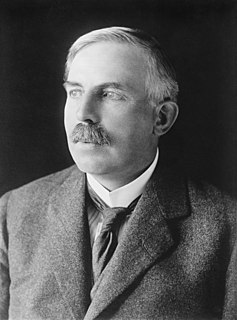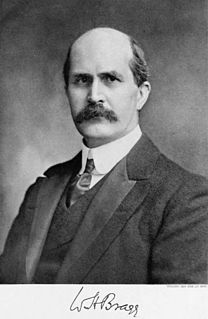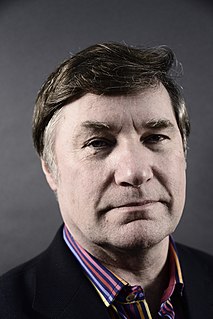A Quote by Swami Vivekananda
Every atom is trying to go and join itself to the next atom. Atoms after atoms combine, making huge balls, the earths, the suns, the moons, the stars, the planets. They in their turn, are trying to rush towards each other, and at last, we know that the whole universe, mental and material, will be fused into one.
Related Quotes
All the green in the planted world consists of these whole, rounded chloroplasts wending their ways in water. If you analyze a molecule of chlorophyll itself, what you get is one hundred thirty-six atoms of hydrogen, carbon, oxygen, and nitrogen arranged in an exact and complex relationship around a central ring. At the ring's center is a single atom of magnesium. Now: If you remove the atom of magnesium and in its exact place put an atom of iron, you get a molecule of hemoglobin. The iron atom combines with all the other atoms to make red blood, the streaming red dots in the goldfish's tail.
From the results so far obtained it is difficult to avoid the conclusion that the long-range atoms arising from collision of alpha particles with nitrogen are not nitrogen atoms but probably atoms of hydrogen, or atoms of mass 2. If this be the case, we must conclude that the nitrogen atom is disintegrated under the intense forces developed in a close collision with a swift alpha particle, and that the hydrogen atom which is liberated formed a constituent part of the nitrogen nucleus.
In a gas, motion has the upper hand; the atoms are moving so fast that they have no time to enter into any sort of combination with each other: occasionally, atom must meet atom and, so to speak, each hold out vain hands to the other, but the pace is too great and, in a moment, they are far away from each other again.
The story is told of Lord Kelvin, a famous Scotch physicist of the last century, that after he had given a lecture on atoms and molecules, one of his students came to him with the question, "Professor, what is your idea of the structure of the atom." "What," said Kelvin, "The structure of the atom? Why, don't you know, the very word 'atom' means the thing that can't be cut. How then can it have a structure?" "That," remarked the facetious young man, "shows the disadvantage of knowing Greek."
I'll be looking for you, Will, every moment, every single moment. And when we do find each other again, we'll cling together so tight that nothing and no one'll ever tear us apart. Every atom of me and every atom of you... We'll live in birds and flowers and dragonflies and pine trees and in clouds and in those little specks of light you see floating in sunbeams... And when they use our atoms to make new lives, they wont' just be able to take one, they'll have to take two, one of you and one of me, we'll be joined so tight.
Every atom you possess has almost certainly passed through several stars and been part of millions of organisms on its way to becoming you. We are each so atomically numberous and so vigorously recycled at death that a significant number of our atoms-up to a billion for each of us, it has been suggested-probably once belonged to Shakespeare. A billion more each came from Buddha and Genghis Khan and Beethoven, and any other historical figure you care to name.





































